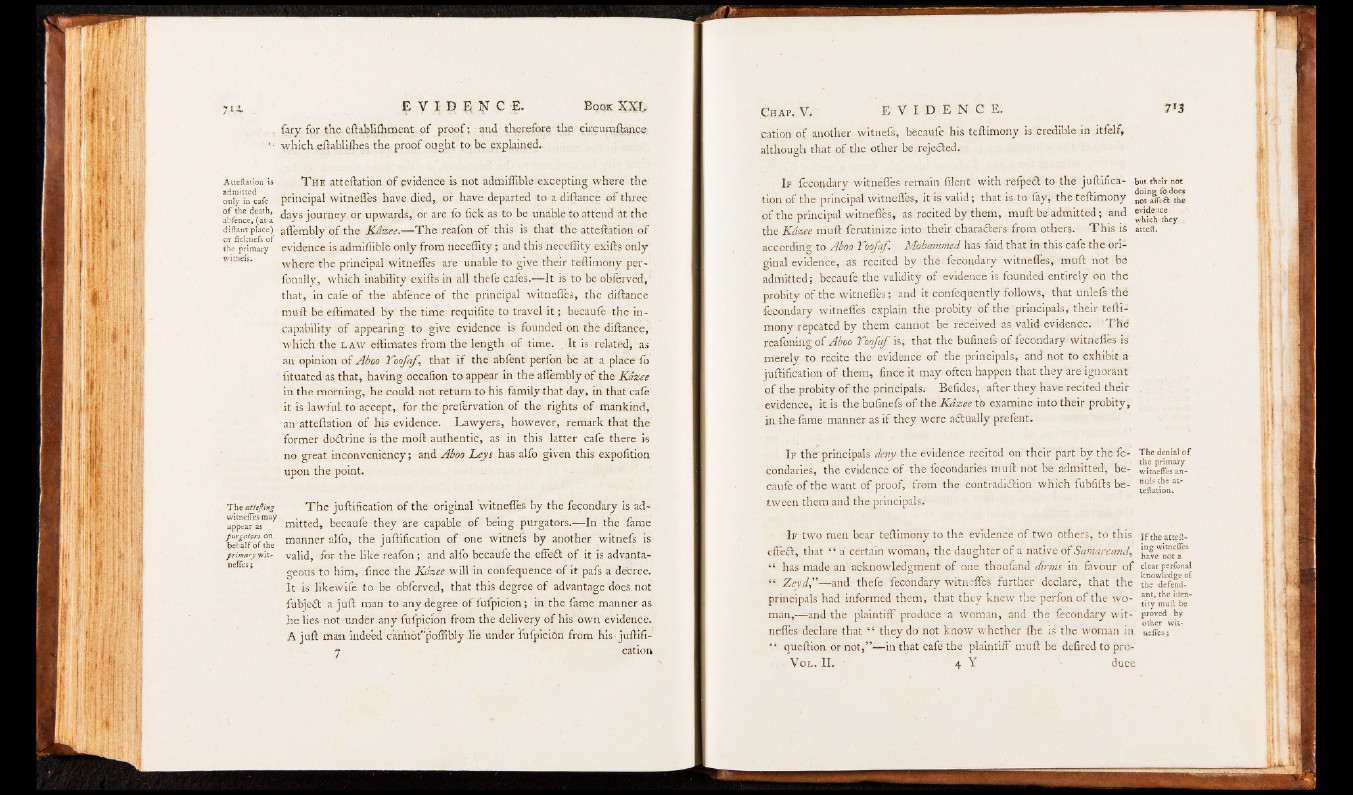
Atteftation is
admitted
only in cafe
o f the death,
abfence, (at a
diftant place)
or licknefs of
the primary
witnefs.
The attifling
witnefles may
appear as
fur gators on.
behalf of the
primary wit-
neffes;
E V I D R 3ST C E. B o o k X X I,
I^ty for the. eftaMifhmenf of proof; and therefore the circunaflance
which eftablifhes the proof ought to; be explained.
T h e atteftatian of evidence is not admiflible excepting where the
principal witnefles have died, of have departed to a diftance of three
days journey or upwards, or are fo fick as to be unable to attend at the
aflembly of the Kdzee.— The reafon of this is that' the atteftation of
evidence is admiflible only from neceffity; and this neceflity exifls only
where the principal witnefles are unable to give their teflimony per-
fonally, which inability exifls in all thefe cafes.— It is to be obferved, ‘
that, in cafe of the abfence of the principal witnefles, the diftance
muft be eftimated by the time requifite to travel i t ; becaufe the incapability
of appearing1 to give evidence is founded on the diftance,
which the law eftimates from the length of time. , It is1 related, as
an opinion of Aboo Yoofaf, that if the abfent perfon be at a place fb
fituated as that, having occafion to appear in the aflembly of the Kdzee
in the morning, he could not return to his family that day, in that cafe
it is lawful to accept, for the prefervation of the rights of mankind,
an atteftation of his evidence. Lawyers, however, remark that the
former doctrine is the moft authentic, as in this latter cafe there is
no great incdnveniency; and Aboo Leys has alfo given this expolition
upon the point.
T h e juftification of the original witnefles by the fecondary is admitted,
becaufe they are capable of being purgators.— In the fame
manner alfo, the juftification of one witnefs by another witnefs is
valid, ■ for the like reafon; and alfo becaufe the effect of it is advantageous
to him, fince the Kdzee will in confequence of it pafs a decree.
It is likewife to be obferved, that this degree of advantage does not
fubjedt a juft man to any degree of fufpicion; In' the fame manner as
he lies not under any fufpicion from the delivery of his own evidence.
A juft man indeed cannot'poflibly lie under fufpicion from his juftifi-
7 cation
Chap. V. E V I D E N C E . V 3
cation of another witnefs, becaufe his teftimony is credible in itfelf,
although that Of the other be rejected.
I f fecondary witnefles remain filent with refpedt to the juftifica- but their not
tion of the principal witnefles, it is valid; that is to fay, the teftimony not Jfea thé
pf the principal witnefles, as recited by them, muft be admitted; and ^
the Kdzee muft ferutinize into their characters from others. This is attefl.
according to AbopYoofaf. Mohammed has faid that in this cafe the original
evidence, as recited by the fecondary witnefles, muft not be
admitted; becaufe, the validity of evidence is founded entirely on the
probity of the witnefles; and it confequently follows, that unlefe the
fecondary witnefles explain the probity of the principals, their tefti->
mony repeated by them cannot be received as. valid evidence.' Thd
reafoning of Aboo Yoofaf is, that the bufinefs of fecondary witnefles-is
merely to recite the evidence of the principals, and not to exhibit a
juftification of them, fince it may often happen that they are ignorant
of the probity of the principals. Befides, after they have recited their .
evidence, it is the bufinefs of the Kdzee tfo examine into their probity,
in the fame manner as if they were adtually prefent.
If th e principals deny the evidence recited on their part by the fe- The denial of
Condaries, the evidence of the fecondaries muft not be admitted, be- witnefles an-
caufe of the want of proof, from the contradiction which fubfifts be-
tween them and the principals!-1 1
I f two men bear teftimony to the evidence of two others, to this ifth eatteft-
effedt, that “ a certain woman, the daughter of a native o f Samarcand, SH SÉ P i
“ has made an acknowledgment of one thoufand dirms in favour of clear perfonal
if Zeyd,”— and thefe fecondary witnefles' further declare, that the the^de'fend”
principals had informed them, that they knew the perfon of the wo-
man,— and the plaintiff produce a woman, and the fecondary wit- proved by
nefl'es declare that “ they do not know whether fhe is the woman in neffes;
“ queftion or not,”— in that cafe the plaintiff muft be defired to pro-
Vol. II. 4 Y duce